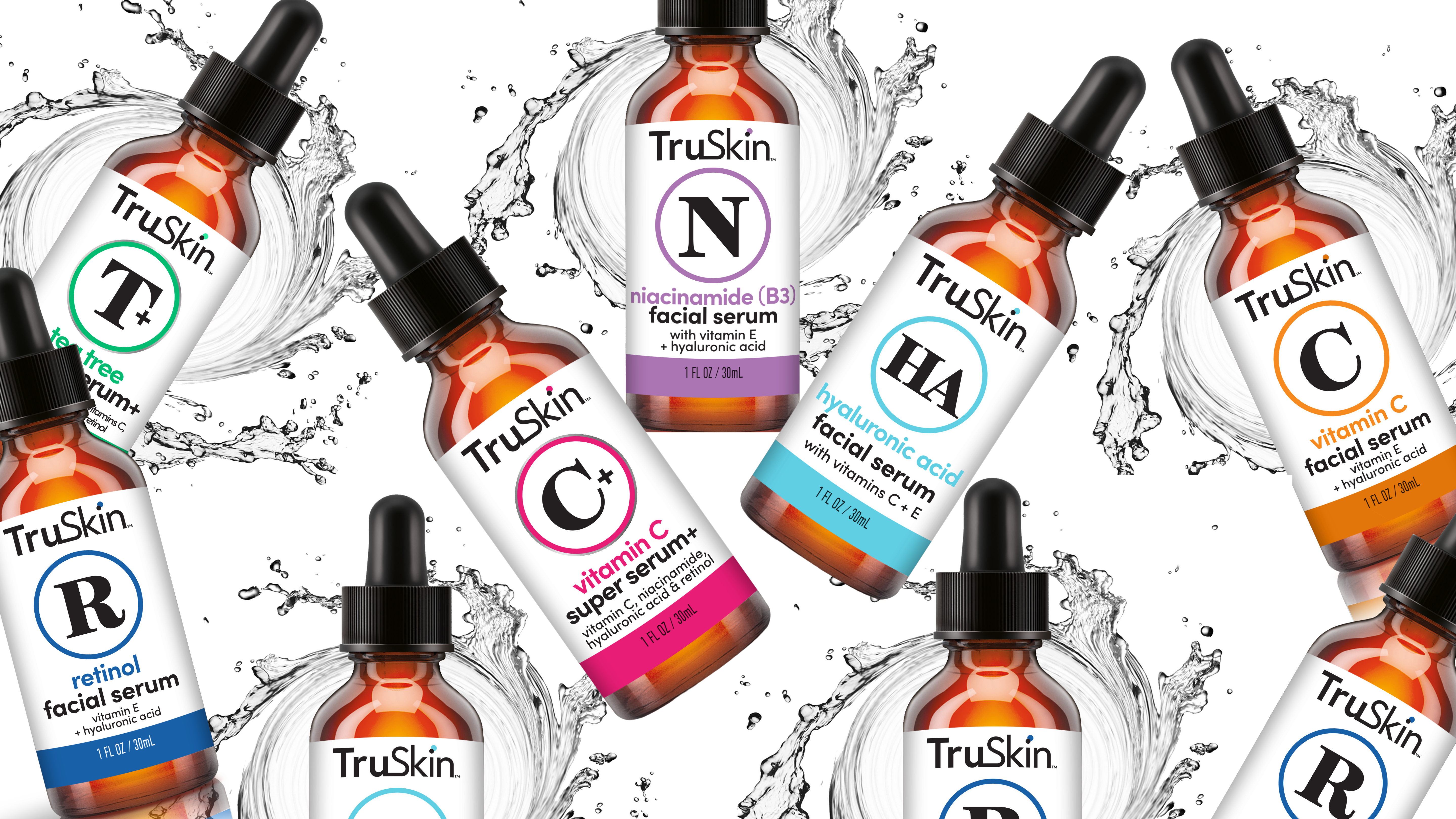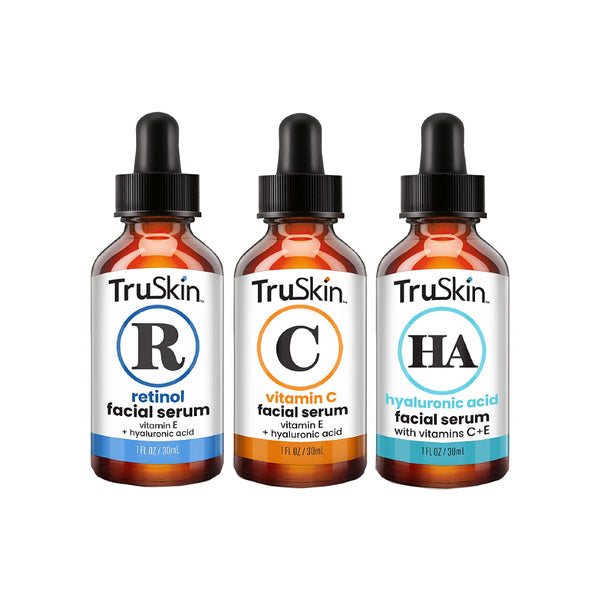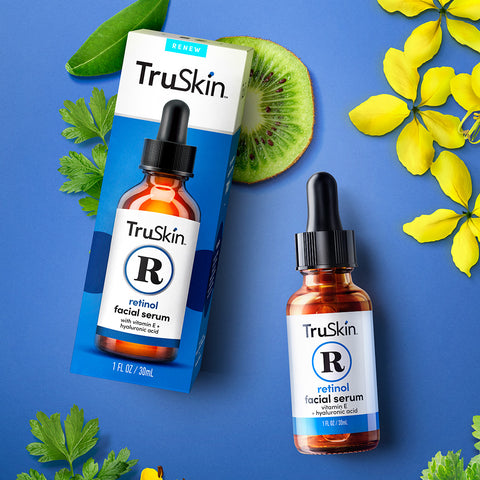
Up Your Fall Skincare Game With An Awesome New Face Serum
Summer’s officially over, folks. So, there’s no better time to add a hard-working face serum into your skincare routine. Frankly, it would be rude not to.
Face serums are mysterious little characters. Often moisturizing, but not really moisturizers; sometimes oily, but definitely not face oils. Mind. Officially. Blown.
But the thing is, a face serum is probably the most important and hard-working product you could have in your skincare arsenal. Sure, it’s not 100 percent vital in terms of keeping your skin clean, moisturized and protected from the sun (they’re the absolute basics for healthy skin, btw). However, if you want to do more than just the bare minimum for your skin and want to keep it looking its best for as long as possible, you simply must include at least one serum in your daily regime.
Not sure where to start? Then allow us to fill you in on all the essential deets. Because summer’s gone, fall’s here and now’s the perfect time to up your skincare game.
What Are Face Serums?
A face serum is a light, water- or gel-based skincare product that’s been formulated to help treat specific concerns or skin conditions like dullness, dehydration or aging. Due to their small, molecular makeup, serums are extremely fast-absorbing and can penetrate deep into your skin. This is why they’re such a great tool for delivering active ingredients exactly where your skin needs them.
How Do Serums Differ To Moisturizers?
Unlike serum, a moisturizer’s main job is to, well, moisturize. Sure, it might contain antioxidants, exfoliating acids and all manner of other skin-loving ingredients as added extras but at the end of the day, a moisturizer’s ability to moisturize your skin is everything. A moisturizer, therefore, is richer than serum and usually contains some kind of emollient or occlusive ingredient (think shea butter, jojoba oil, coconut oil etc.) to create a barrier and stop moisture from escaping from the surface of your skin.
Serums, on the other hand, are lighter and contain much smaller molecules than their moisturizing cousins. Of course, serums can contain hydrating ingredients to help your skin retain moisture, but they don’t often contain occlusive or emollient ingredients (think shea butter, coconut oil etc) which form a seal on the surface of your skin. If they did, they wouldn’t retain such a lightweight composition and they wouldn’t absorb into your skin in such a timely, effective manner.
Is A Face Serum Right For Me?
Probably… but who knows? There are so many different formulations around, there’s bound to be one to suit your needs. However, the most important thing is to always patch test any new serum before applying it all over your face and neck for the first time.
To perform a patch test, apply a small amount to a discreet area of clean skin either behind your ears, inside your elbow, on your wrist or on the side of your neck. Then leave it for a good 48 hours to check for any negative reactions. If everything’s a-okay after this time, you’re good to go. Even mild reactions such as redness or a little tingling that settles down after an hour is fine – this is just those awesome ingredients getting to work. However, anything that’s continually uncomfortable or painful is a major red flag. If you experience a bad reaction like this, immediately cleanse your skin and don’t use it again. And if symptoms continue to get worse, always seek advice from a skincare expert.
How Do I Choose A Serum To Suit My Skin Concerns?
Most formulations will feel similarly lightweight and watery or gel-like, so that’s not really a factor. Instead, it’s all about those active ingredients inside.
Here are five awesome ingredients to look out for in a face serum, depending on your skin’s concerns:
1. Hyaluronic Acid
Great For: All skin types.
Hyaluronic acid is one of the best ingredients for hydrating your skin. It’s known as a humectant which means it works like a sponge to draw water to the surface of your skin.
2. Retinol
Great For: Aging or acne-prone skin.
Retinol is seen as the best of the best when it comes to boosting cell turnover and therefore working on everything from fine lines and wrinkles through to dark spots and pimples.
3. Vitamin C
Great For: Dull skin.
One of the most studied antioxidant in skincare, vitamin C protects your skin from free radical damage and inhibits melanin production to boost your skin’s glow factor and improve hyperpigmentation.
 4. Niacinamide
4. Niacinamide
Great For: All skin types, particularly sensitive.
Otherwise known as vitamin B3, niacinamide is a gentle, but effective antioxidant. It works really well with the natural substances in your skin to improve tone, texture and the visible signs of aging.
5. Salicylic Acid
Great For: Oily or combination skin.
Salicylic acid is an oil-soluble chemical exfoliator that gets deep into your pores to reduce excess sebum, reduce acne breakouts and boost cell turnover.
How & When Should I Apply My Face Serum?
The general rule with skincare is that lighter products should always be applied first so they don’t have to fight with the heavies to reach the surface of your skin. This means, therefore, that serum should always be applied before moisturizer, to cleansed, toned skin. Then you can follow with a face oil and finally, that all-important, never-to-be-forgotten sunscreen (in the morning, of course!).
When it comes to your application technique, NEVER place the serum dropper directly onto your face as this can transfer oil and bacteria from your skin straight back into the bottle. Instead, apply one or two drops of serum onto clean hands, then apply it over your face and neck. Pat it gently all over cleansed skin and don’t worry about massaging it in. This is totally unnecessary. Serums are light enough to absorb into your skin without your help.
All serums are different, but most can be applied every day. Oftentimes, however, two or three times a week is enough – especially with the super potent serums that really pack a potent punch. Just make sure you read your labels for full instructions so you don’t overload your skin and end up causing irritation.












